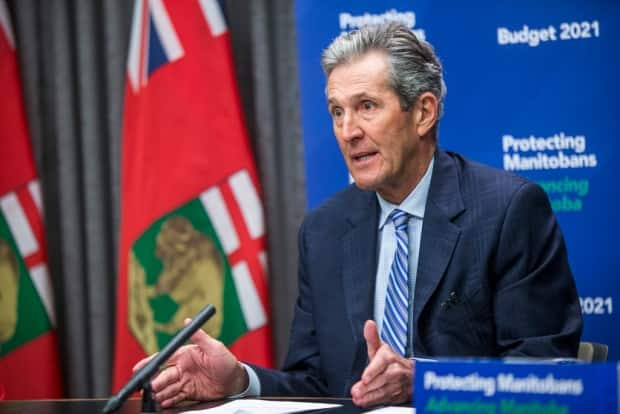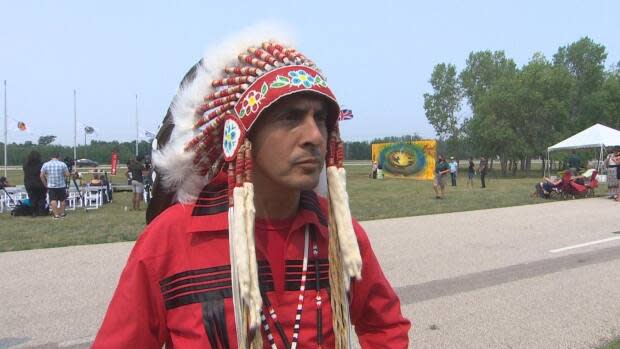Pallister apologizes after inflammatory comments on Canada's origins

Manitoba Premier Brian Pallister apologized on Tuesday for his recent and widely condemned remarks on Canadian history, but said his heart was in the right place.
Pallister had initially defended his July 7 comments — made after protesters toppled statues of Queen Victoria and Queen Elizabeth II at the legislature — that "people who came here to this country before it was a country, and since, didn't come here to destroy anything, they came here to build."
The rally, which ended at the legislature, was held to remember Indigenous children who died at residential schools.
The premier apologized at a media briefing.
"I feel awful about the reaction and the misunderstanding I created with my comments," he said.
WATCH | Premier says he's still dedicated to reconciliation:
But Pallister stuck to his position that he was trying to pay tribute to the people — Indigenous and non-Indigenous — who've built families and communities in Canada.
Uniting Manitobans, he said, is "what we have the opportunity to do now as a result of the horrible shock that many Canadians are experiencing" with the discovery of unmarked burial sites on the grounds of former residential schools.
"I'm hopeful we can move forward, and I do apologize for the misunderstanding I caused."
Pallister's initial remarks were quickly rebuked. His own Indigenous relations minister resigned, Indigenous leaders demanded an apology and rare criticism from members of the Tory leader's own caucus was aired publicly.
He stood by his comments in two subsequent media appearances, but then took an uncharacteristic 19-day absence from the microphone. He hadn't spoken publicly since his new appointee as Indigenous reconciliation minister, Alan Lagimodiere, angered people for suggesting the architects of residential schools believed "they were doing the right thing." Lagimodiere apologized the next day.
Out of the limelight
Asked Tuesday to explain his departure from the public eye, Pallister said he needed to speak after seeing "more and more misrepresentations of what I've said."
He said he was trying to bring people together.
"I saw the reactions and I understood that I was misunderstood, and I apologize for that, I should have been clearer in my comments, but my heart was in the right place."
In a subsequent written statement, Pallister said he has been reflecting on the enduring trauma brought by residential schools.
"I wish my words in speaking to Manitobans at this difficult time had been said differently so they could have been understood better. My words did not adequately convey all that I meant, which I sincerely regret."
"At no time have I ever justified the existence of residential schools in Canada and the lasting harm they inflicted on Indigenous persons. This is not who I am and has never been part of my long record of advocating for progress for Indigenous peoples and the specific steps my government has taken, of which I am very proud," his statement continued.
Grand Chief Arlen Dumas with the Assembly of Manitoba Chiefs said the premier's words ring hollow after his "egregious" comments and initial defence of them.
"I don't think you can retract that. I would actually expect a better apology than saying, 'Sorry, I was misrepresented.' That's not really an apology," he said.

Christopher Adams, adjunct professor of political studies at the University of Manitoba, said Pallister's regrets won't go far enough for some, but he said it is good of the premier to take some responsibility.
"I mean, part of his problem has been he's a leader who has a strong stubborn streak, and the fact that he's coming back in some ways on this, I think it helps," said Adams, noting the premier recognized Indigenous people and their history in building in his remarks Tuesday.
"Even if [the apology is] not accepted by many people, I think there will be people within his party who would say that's sufficient."
Pallister's political opponents questioned if his comments were genuine.
"He's not really clearly saying that he did anything wrong. He's just sorry for the fact it was misunderstood," NDP Leader Wab Kinew said.
Liberal Leader Dougald Lamont said Pallister is pointing fingers at others.
"He's not sorry for anything because he's still blaming everyone else."
Retirement question deflected
The latest controversy has again raised suspicions Pallister's retirement from politics is imminent. He's previously hinted he won't serve his entire second term in office. The next election is slated for October 2023.
Asked if he plans to leave office in the coming months, Pallister told the reporter they would be among the first to know if he decides to step down.
Lagimodiere, another member of Pallister's caucus under fire for his comments, also spoke Tuesday in his first public appearance in weeks.
While speaking at the 150th anniversary event of the signing of Treaty 1, he said there is no defence of residential schools, which he described as a genocide.

